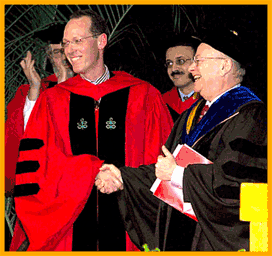In the spring of 1983, Paul Farmer landed in Port Au Prince, Haiti. The poverty and disease he encountered there would ultimately lead to a lifelong battle for health and social justice. However, just as important as the work he would later embark on are the events that led him to it.

Graduation. |
Paul Edward Farmer was born on October 26, 1959 in North Adams, Massachusetts. His father, Paul Sr., was known to Farmer and his five siblings as the "Warden" due to his strictness. When Farmer was seven years old, Paul Sr. took his family south to Alabama, where they lived in a house lacking furniture and vacationed in a bus that had previously served as a mobile tuberculosis clinic. However, the growing racial tensions that accompanied the civil rights movement in Birmingham worried the family. They moved to Florida, this time living in a trailer park, while Farmer's mother worked as a cashier at the local Winn-Dixie. Paul Sr. soon added a boat and two cars to his fleet. From then on the family of six ate, read, and slept next to Jenkins Creek on the Gulf Coast. Living in often loud and cramped places, the young Paul aquired the ability to study almost anywhere, and graduated as President of his highschool class with a full scholarship to Duke University.
In college, Farmer was introduced to wealth; and was both mesmerized and repulsed by it. Having grown up with very little, he was drawn to the affluence of many of his fellow students. However, he would soon be introduced to a kind of poverty that even he had not experienced before. He made friends quickly and continued to do exceptionally well in school. Farmer left college after his first semester to spend two seasons in Paris, where he attended a class taught by the famous anthropologist, Claude Levi-Strauss. Upon returning to Duke, he studied medical anthropology and discovered the works of the German scientist Rudolf Virchow. Through Virchow, Farmer was exposed to ideas like "full and unlimited democracy," and "medicine as a social science". These same tenets would serve as the foundation for Partners In Health and his work in Haiti years later. Farmer also knew that most Americans knew very little about the rest of the world, and he wanted to learn more about political and social situations in places like El Salvador and Haiti. He was introduced to Haitians living and working in terrible conditions on tobacco plantations and began to take a great interest in the migrant workers. After graduating with honors from Duke University, Farmer won a thousand dollars for an essay on Haitian writers. There was no hesitation about what to do with this money. He would go to Haiti.

